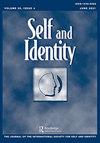Dual-centric work/family identity in young adults
IF 2.1
4区 心理学
Q3 PSYCHOLOGY, SOCIAL
引用次数: 3
Abstract
ABSTRACT In the present study, we studied young adults who think work and family are equally and highly central – those with dual-centric work/family identities. Using a mixed-method approach, we explored their characteristics, costs, benefits, and strategies of dual-centric work/family identities. The sample consisted of 124 participants, of which 36 participants (50% female) had dual-centric work/family identities. They reported higher levels of work satisfaction compared to those without dual-centric identities. Thematic analyses of interviews showed intra- and inter-individual costs and benefits. Strategies to handle the dual-centric identities included time management, communication approaches, and cognitive tactics. Thus, dual-centric identities are individual, but also relational as others are part of consequences and strategies. Practical and theoretical implications of dual-centric identities are discussed.年轻人的工作/家庭双重中心身份
在本研究中,我们研究了那些认为工作和家庭同等重要的年轻人-那些具有双重中心工作/家庭身份的人。采用混合方法,我们探讨了他们的特点、成本、收益和双重中心的工作/家庭身份的策略。该样本由124名参与者组成,其中36名参与者(50%为女性)具有工作/家庭双重中心身份。与没有双重中心身份的人相比,他们的工作满意度更高。访谈的专题分析显示了个人内部和个人之间的成本和收益。处理双重中心身份的策略包括时间管理、沟通方法和认知策略。因此,双重中心身份是个体的,但也是关系的,因为其他人是后果和战略的一部分。讨论了双中心身份的实践和理论意义。
本文章由计算机程序翻译,如有差异,请以英文原文为准。
求助全文
约1分钟内获得全文
求助全文
来源期刊

Self and Identity
PSYCHOLOGY, SOCIAL-
CiteScore
5.10
自引率
5.00%
发文量
26
期刊介绍:
Work on self and identity has a special place in the study of human nature, as self-concerns are arguably at the center of individuals" striving for well-being and for making sense of one"s life. Life goals develop and are influenced by one"s view of what one is like, the way one would ideally like to be (or would like to avoid being), as well as one"s perceptions of what is feasible. Furthermore, conceptions of self and the world affect how one"s progress towards these goals is monitored, evaluated, redirected, re-evaluated, and pursued again. Thus, the “self” as a construct has far-reaching implications for behavior, self-esteem, motivation, experience of emotions and the world more broadly, and hence for interpersonal relationships, society, and culture.
 求助内容:
求助内容: 应助结果提醒方式:
应助结果提醒方式:


